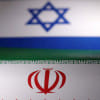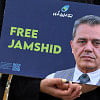Iran's re-entrance in the global economy
January 16, 2016 was a momentous day for Iran. On that day, the (IAEA) reported to the UN Security Council that Iran had completed necessary preparatory steps to start the implementation of the Joint Comprehensive Plan of Action (JCPOA).
On January 17, 2016 the Security Council announced that it has removed all restrictions against Iran that led to the implementation of the plan. Simultaneously, the US and the European Union lifted the sanctions that were imposed on Iran over the past decade.
The lifting of sanctions will have economic and political implications for Iran and the region.
Iran's economy was on the decline since the imposition of UN sanctions in 2006. But its resilient economy did not face a complete collapse despite crippling sanctions. With a population of 80 million and a literacy rate of 84 percent, Iran has a strong talent base, which will help drive its economic recovery. Though 2015 was a period of recession, the International Monetary Fund estimates Iran's GDP will grow by 5 percent during 2016-17.
The biggest source of cash for Iran is its oil reserves. With 10 percent of the world's proven oil reserves and 15 percent of gas reserves, Iran is considered to be an energy superpower. Multinational oil companies are ready to invest billions in Iran's petrochemical sector. Iran will hike sales by 500,000 barrels now and increase total exports to around 2.5 million barrels by 2017. Though oil prices have slumped, the country is expected to earn around $10 billion by next year. Tehran will immediately get back $50 billion cash reserves, out of the $100 billion cash reserves that were held up due to the sanctions. Infrastructure development and external businesses will thus benefit from a huge impetus thanks to such cash inflow. At a time when global economic growth is moribund, Iran's re-entry into the global economy is good news for world business.
Multinational companies and official delegations from Europe, Japan, China, Russia and other countries have been making a bee-line to jump into the rich Iranian market. Iran has already ordered 114 planes from the Airbus consortium. German and French motor companies have already reached Tehran with aggressive car sales plans while Russia is working on infrastructure projects. American companies, however, are at a disadvantage, as the US has no diplomatic ties with Iran and because of fresh US sanctions imposed on Iran's ballistic missile programme. But these companies are likely to enter the Iranian economy through their subsidiaries.
Iran goes to polls on February 26, 2016 to elect 310 members for the Consultative Assembly (lower house of parliament) and 100 members for the Assembly of Experts (upper house). Considering the moderate approach of "reformist" President Rouhani and his success in nuclear negotiations, it is unlikely that hardliners will dominate the Parliament. Iran's internal political stability, therefore, is not under any threat.
The country that is most disturbed with this reversal of sanctions is Saudi Arabia. Already, there is too much oil in the world market chasing too few customers. With Iran's entry, the price of oil may fall further from its current price of $28 per barrel, the lowest in 12 years, further reducing Saudi oil revenues.
Besides, the Sunni-Shia sectarian schism has become wider with the rupture of diplomatic relations between Saudi Arabia and Iran. Meanwhile, in an attempt to defuse the tension, Iran's supreme leader Ayatollah Ali Khamenei on January 20 publicly condemned the attack on the Saudi embassy in Tehran on January 2, as "a very bad and wrong incident". Though verbal duels continue, it is unlikely that Rouhani will provoke a situation that will jeopardise the diplomatic gains that his government has made over the past three years with the West.
Pakistan's PM Nawaz Sharif has already visited Riyadh on January 18 and Tehran on January 19, in an effort to mediate between the two countries. Chinese President Xi Jinping's visit (January 19-23, 2016) to the region is expected to have a sobering effect on Saudi Arabia, Egypt and Iran.
The JCPOA is slowly pushing American-Iranian relations towards rapprochement, despite some differences. Washington is aware that keeping Tehran engaged is vital to resolve the wars in Syria and Yemen, and to eliminate ISIL. Interestingly, John Kerry continues his telephone diplomacy with his Iranian counterpart Javad Zarif. The recent arrest and release of the US navy sailors by Iran and the prisoner swap deal are cases in point.
President Obama is upbeat about the diplomatic solution to Iran's nuclear programme, even though some anti-Iran posturing by Washington exists to appease public opinion of Israel. After the botched P5+1 nuclear talks with North Korea, Obama has a point to prove - that patient diplomacy, rather than war, can solve even the most intractable problem.
One should not be surprised if Washington re-establishes diplomatic ties with Tehran before the end of President Barack Obama's term in November 2016. However, what will be the fate of the JCPOA after the November 2016 US presidential elections is anyone's guess, particularly if a Republican is elected to the White House.
The biggest loser of the US-Iran rapprochement is Israel. However, Rouhani has not issued any threat to Israel as his hardline predecessor Ahmadinejad had done. Nevertheless, Benjamin Netanyahu continues to deride the JCPOA and peddle hatred against Iran.
The UN Security Council Resolution 2231 (2015) has recognised Iran's right to have a peaceful nuclear programme. By meeting the conditions of the JCPOA, Iran has given up the prospect of acquiring a nuclear device, at least for the next 15 years. It is unlikely that Iran will renege on the JCPOA and risk a snap-back of sanctions. Ayatollah Ali Khamenei has warned, however, that any fresh sanction will terminate Iran's compliance to the JCPOA.
John Kerry's "safer world" is not entirely correct, as the Middle East is not free from Israel's nuclear weapons. For Rouhani, January 16 was a historic day as Iran got its debilitating sanctions removed and re-entered the global economy.
The writer is former Ambassador and Secretary.

 For all latest news, follow The Daily Star's Google News channel.
For all latest news, follow The Daily Star's Google News channel. 








Comments